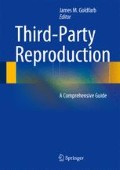Abstract
Embryo donation shares characteristics of, and is also distinct from, other forms of family building. Yet research on the psychological aspects of embryo donation is characterized by its very absence. Research that does exist involves small sample sizes, homogenous demographic characteristics, the use of self-reports, and a non-longitudinal focus. Significant research is lacking concerning the reasons recipient couples use donated embryos. Limited research to date suggests positive, rather than adverse, outcomes for embryo-donation children. The use of donated embryos also does not appear to impact negatively the parenting or psychological adjustment or marital relationship of the couple. Currently, limited research suggests that embryo-donation parents are less likely to disclose the information concerning conception and genetic origin to their child than parents of adoptive or IVF children, but no research has compared the psychological functioning of embryo-donation children based on disclosure status. Similarly, little has been written on the impact of donation on donor couples and their existing families, including their attitudes and experiences regarding donation over time. More research specific to embryo donation is clearly needed.
Access this chapter
Tax calculation will be finalised at checkout
Purchases are for personal use only
References
Machin L. A hierarchy of needs? Embryo donation, in vitro fertilisation and the provision of infertility counselling. Patient Educ Couns. 2011;85:264–8.
Söderström-Anttila V, Foudila T, Ripatti UR, Siegberg R. Embryo donation: outcome and attitudes among embryo donors and recipients. Hum Reprod. 2001;16(6):1120–8.
MacCallum F, Golombok S, Brinsden P. Parenting and child development in families with a child conceived through embryo donation. J Fam Psychol. 2007;21(2):278–87.
Ethics Committee of the American Society for Reproductive Medicine. American society for reproductive medicine: defining embryo donation. Fertil Steril. 2009;92(6):1818–9.
Applegarth LD. Embryo donation: counseling donors and recipients. In: Covington S, Hammer Burns L, editors. Infertility counseling: a comprehensive handbook for clinicians. 2nd ed. Cambridge: Cambridge University Press; 2006. p. 356–69.
Goedeke S, Payne D. Embryo donation in New Zealand: a pilot study. Hum Reprod. 2009;24(8):1939–45.
Widdows H, MacCallum F. Disparities in parenting criteria: an exploration of the issues, focusing on adoption and embryo donation. J Med Ethics. 2002;28(3):139–42.
Colpin H. Parenting and psychological development of IVF children; review of the research literature. Dev Rev. 2002;22:644–73.
Gibson F, McMahon C. Parenting and child psychosocial development after infertility management. Int Congr Ser. 2004;1266:351–8.
MacCallum F, Keeley S. Embryo donation families: a follow-up in middle childhood. J Fam Psychol. 2008;22(6):799–808.
Shelton KH, Boivin J, Hay D, van den Bree MBM, Rice FJ, Harold GT, et al. Examining differences in psychological adjustment problems among children conceived by assisted reproductive technologies. Int J Behav Dev. 2009;33(5):385–92.
Sutcliffe AG, Ludwig M. Outcome of assisted reproduction. Lancet. 2007;370:351–9.
Greenfeld DA. The impact of disclosure on donor gamete participants: donors, intended parents and offspring. Curr Opin Obstet Gynecol. 2008;20(3):265–8.
MacCallum F, Golombok S. Embryo donation families: mothers’ decisions regarding disclosure of donor conception. Hum Reprod. 2007;22(11):2888–95.
MacCallum F. Embryo donation parents’ attitudes towards donors: comparison with adoption. Hum Reprod. 2009;24(3):517–23.
MacCallum F, Keeley S. Disclosure patterns of embryo donation mothers compared with adoption and IVF. Reprod Biomed Online. 2012;24(7):745–8.
Readings J, Blake L, Casey P, Jadva V, Golombok S. Secrecy, disclosure and everything in-between: decisions of parents of children conceived by donor insemination, egg donation and surrogacy. Reprod Biomed Online. 2011;22:485–95.
Kirkman M. Egg and embryo donation and the meaning of motherhood. Women Health. 2003;38(2):1–18.
de Lacey S. Patients’ attitudes to their embryos and their destiny: social conditioning? Best Pract Res Clin Obstet Gynaecol. 2007;21(1):101–12.
McMahon CA, Saunders DM. Attitudes of couples with stored frozen embryos toward conditional embryo donation. Fertil Steril. 2009;91(1):140–7.
Goedeke S, Payne D. A qualitative study of New Zealand fertility counsellors’ roles and practices regarding embryo donation. Hum Reprod. 2010;25(11):2821–8.
Frith L, Blyth E, Paul MS, Berger R. Conditional embryo relinquishment: choosing to relinquish embryos for family-building through a Christian embryo ‘adoption’ programme. Hum Reprod. 2011;26(12):3327–38.
Paul MS, Berger R, Blyth E, Frith L. Relinquishing frozen embryos for conception by infertile couples. Fam Syst Health. 2010;28(3):258–73.
Practice Committee of the American Society for Reproductive Medicine and Practice Committee of the Society for Assisted Reproductive Technology. Recommendations for gamete and embryo donation; a committee opinion. Fertil Steril. 2013;99(1):47–62.
Author information
Authors and Affiliations
Corresponding author
Editor information
Editors and Affiliations
Rights and permissions
Copyright information
© 2014 Springer Science+Business Media New York
About this chapter
Cite this chapter
Childress-Beatty, L. (2014). Embryo Donation: Psychological Aspects. In: Goldfarb, J. (eds) Third-Party Reproduction. Springer, New York, NY. https://doi.org/10.1007/978-1-4614-7169-1_11
Download citation
DOI: https://doi.org/10.1007/978-1-4614-7169-1_11
Published:
Publisher Name: Springer, New York, NY
Print ISBN: 978-1-4614-7168-4
Online ISBN: 978-1-4614-7169-1
eBook Packages: MedicineMedicine (R0)

